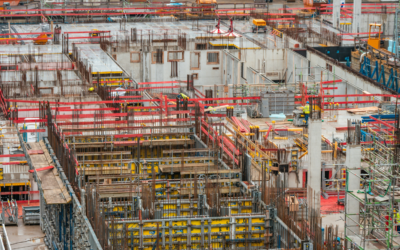Are you wondering what do civil engineers do?
Civil engineering is the backbone of modern society. From roads and bridges to water systems and skyscrapers, civil engineers are the masterminds behind the infrastructure we rely on every day.
If you’re a property or real estate developer, understanding the role of civil engineers is crucial for successful projects. This blog explores what civil engineers do, their specializations, and how their expertise is indispensable for infrastructure development.
What Do Civil Engineers Do?
Civil engineers are responsible for planning, designing, constructing, and maintaining the infrastructure that keeps our world running. Their work encompasses a diverse range of projects, including buildings, roads, bridges, and water systems. They not only oversee construction projects but also ensure they are safe, sustainable, and cost-effective.
Property and real estate developers often work with civil engineers to bring their commercial or residential projects to life. Whether designing structural components or analyzing environmental impacts, civil engineers work to bring the project to life and play a pivotal role in transforming visions into reality.
Roles in Construction and Infrastructure Projects
- Design: Developing design plans and blueprints that meet safety standards and regulations.
- Construction Oversight: Supervising construction sites to ensure projects align with approved designs and specifications.
- Maintenance and Safety: Inspecting and maintaining existing infrastructure to ensure long-term functionality and safety.
- Sustainability: Developing solutions for energy-efficient and environmentally friendly systems.
Understanding Civil Engineering Technology
Civil engineering technology plays a pivotal role in shaping the modern world by bridging the gap between engineering principles and practical application. This field focuses on implementing innovative tools, systems, and methodologies to design, construct, and maintain infrastructure efficiently and sustainably.
From advanced materials like self-healing concrete to the integration of Geographic Information Systems (GIS) in project planning, technology has revolutionized how civil engineers address complex challenges. Automation and digital tools, such as Building Information Modeling (BIM), streamline construction processes, increase accuracy, and reduce project timelines.
Understanding civil engineering technology is critical for professionals striving to develop resilient infrastructure that meets the growing demands of a rapidly changing world.
Specializations in Civil Engineering
Civil engineering services are a broad field with various specializations, each addressing specific aspects of infrastructure development:
1. Structural Engineering
Structural engineers focus on the design and stability of structures like buildings, bridges, and other load-bearing systems. Their expertise ensures that these structures can withstand forces like wind, earthquakes, and heavy loads.
2. Environmental Engineering
Environmental engineers tackle projects like waste management, sewage systems, and air and water quality improvement. Their work ensures infrastructure minimizes environmental impact while promoting public health.
3. Geotechnical Engineering
Geotechnical engineers study soil, rock, and groundwater to determine how they interact with potential foundations. Their analyses are critical for construction on challenging terrains and preventing structural failures.
4. Transportation Engineering
Transportation engineers design and optimize transportation systems, including highways, railways, and traffic patterns. Their work improves efficiency, safety, and connectivity for the public.
5. Water and Sewage Systems
Engineers specializing in water systems design efficient and sustainable water supply and sewage systems. Their work directly impacts public health and environmental sustainability.
The Role of Civil Engineers in Infrastructure Development
Behind every successful development project, civil engineers are hard at work ensuring efficiency, safety, and quality.
Planning and Design
Civil engineers collaborate with architects, property developers, and local governments to analyze feasibility, develop cost estimates, and create design specifications. Their expertise helps streamline the planning process to avoid unforeseen obstacles.
Construction and Project Management
Engineers oversee construction sites, coordinate with government officials, and manage building materials. They ensure that projects align with timelines, budgets, and regulatory requirements.
Ensuring Public Safety and Sustainability
From designing earthquake-resistant buildings to reducing the environmental impact of construction projects, civil engineers prioritize safety and sustainability in every aspect of their work.
Developing Innovative Solutions
Civil engineers constantly innovate to tackle challenges like climate change, aging infrastructure, and urban population growth. By incorporating advanced technologies such as computer-aided design (CAD), AI-driven systems, and hydraulic systems, they create efficient and cutting-edge solutions.

Skills and Qualifications of Civil Engineers
Becoming a professional civil engineer requires rigorous education, technical expertise, and problem-solving skills:
Educational Requirements
- Bachelor’s Degree in civil engineering or a related field is a foundation for entering the profession.
- Some positions may require a Master’s Degree or specialized training in structural or environmental engineering.
Technical Skills
- Computer-Aided Design (CAD): Engineers use CAD tools to create precise design plans.
- Practical Experience: Engineers must have hands-on experience managing construction sites and infrastructure projects.
- Hydraulic Systems Knowledge: Many civil engineers develop expertise in managing water flow within structures.
Soft Skills
- Problem Solving and Innovation: Civil engineers tackle complex problems with practical solutions.
- Communication: Coordinating with construction teams, local governments, and other stakeholders is vital.
- Project Management: Engineers handle multiple tasks simultaneously to ensure project success.
Career Opportunities for Civil Engineers
Civil engineers have diverse career paths across various sectors:
Top Employers and Sectors
- Government: Engineers work with federal, state, and local governments on infrastructure projects.
- Construction Firms and Consulting Firms: Many engineers work in the private sector, helping design and build infrastructure.
Popular Job Titles
- Construction Engineers
- Transportation Engineers
- Environmental Engineers
Career Resources for Aspiring Engineers
To become a civil engineer, explore general engineering education resources, accredited programs, and licensing paths such as the Fundamentals of Engineering (FE) exam and Professional Engineer (PE) license.
Why Civil Engineers Matter for Property and Real Estate Developers
For property developers, civil engineers are key to bringing ideas to life. They ensure safe and sustainable designs, manage construction processes, and provide expertise that can save time and money.
When working on construction projects, civil engineers analyze site conditions, prepare survey reports, design structures, and secure permits. Their comprehensive role helps streamline the development process, ensuring everything runs smoothly.
South Coast Improvement Company’s Comprehensive Design-Build Services
Leading the charge in combining civil engineering expertise with seamless project execution, South Coast Improvement Company provides design-build services that reduce risks while improving timelines.
The Single Source Model
SCI’s “single source” model coordinates architects and builders to ensure a cohesive and streamlined approach, eliminating conflicts and saving clients valuable resources.
Award-Winning Services
Recognized by the Design-Build Institute of America with a Bronze Award in 2022, South Coast Improvement is trusted for delivering projects that meet the highest standards in the industry.
Design-Build Service Package
South Coast Improvement’s approach includes:
- End-to-End Management: From design plans to project completion, SCI takes responsibility for the entire process.
- Open Communication and Collaboration: Ensuring transparency and teamwork at every step.
- Cost Efficiency and Timeliness: SCI significantly reduces unforeseen costs by managing complex projects with precision.

Build a Better Future With South Coast Improvement Company
Civil engineers are the unsung heroes of our infrastructure, ensuring that our cities remain safe, sustainable, and functional. For property and real estate developers, their expertise is indispensable for successful construction projects.
When you’re ready to start your next project, contact South Coast Improvement Company. Their comprehensive design-build services offer the project planning and execution expertise you need. Explore our website to learn more about our successful projects and read client testimonials. Together, we’ll transform your vision into reality.
Learn More About Civil Engineering
To deepen your understanding of civil engineering and its broad impact on modern society, explore these valuable resources:
- American Society of Civil Engineers (ASCE) – Discover industry standards, professional guidance, and insights into the latest innovations in civil engineering.
- National Council of Examiners for Engineering and Surveying (NCEES) – Learn about licensing requirements and examination details for civil engineers across the United States.
- Structural Engineers Association (SEA) – A great resource for those specializing in structural facets of civil engineering, focusing on safety and design standards.
- Engineering for Change (E4C) – Explore how civil engineering addresses global challenges and promotes sustainable development initiatives worldwide.
- The Institution of Civil Engineers (ICE) – A globally recognized association that offers resources, professional development opportunities, and industry news for civil engineers.
- American Society of Civil Engineers (ASCE) – Access a wealth of information on civil engineering disciplines, including research papers, webinars, and networking events.
- Geo-Institute (G-I) – A branch of ASCE dedicated to geotechnical engineering, offering resources for advancing knowledge in soil mechanics, foundation design, and more.
- World Federation of Engineering Organizations (WFEO) – Focused on promoting engineering excellence and addressing global challenges, this federation provides valuable insights for civil engineers worldwide.
- National Association of Women in Construction (NAWIC) – A resource dedicated to empowering women in the construction and civil engineering sectors through training, support, and networking opportunities.
These resources provide credible, detailed, and professional insights for anyone interested in or working within the field of civil engineering.
View Our Work
Aspen Dental
Partnering with The Aspen Group on the construction of a new Aspen Dental facility that’s functional & welcoming for patients & staff alike. South Coast Improvement Company was awarded the construction of a new Aspen Dental facility in Killingly, CT. The...
Springhouse Senior Living – HumanGood
Designed to enhance comfort & functionality. South Coast Improvement company was hired by HumanGood for an interior and exterior renovation at Springhouse Senior Living. Our skilled teamtransformed the 2nd through 5th floor common areas into brighter, more...






